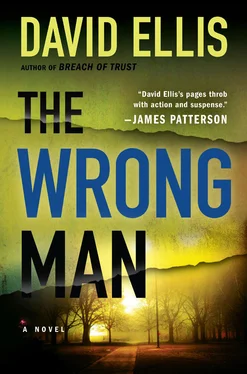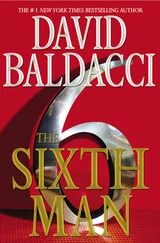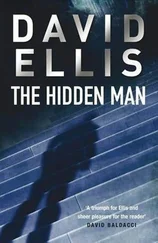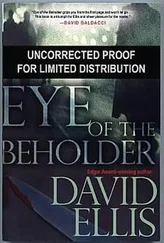David Ellis - The Wrong Man
Здесь есть возможность читать онлайн «David Ellis - The Wrong Man» весь текст электронной книги совершенно бесплатно (целиком полную версию без сокращений). В некоторых случаях можно слушать аудио, скачать через торрент в формате fb2 и присутствует краткое содержание. Жанр: Триллер, на английском языке. Описание произведения, (предисловие) а так же отзывы посетителей доступны на портале библиотеки ЛибКат.
- Название:The Wrong Man
- Автор:
- Жанр:
- Год:неизвестен
- ISBN:нет данных
- Рейтинг книги:3 / 5. Голосов: 1
-
Избранное:Добавить в избранное
- Отзывы:
-
Ваша оценка:
- 60
- 1
- 2
- 3
- 4
- 5
The Wrong Man: краткое содержание, описание и аннотация
Предлагаем к чтению аннотацию, описание, краткое содержание или предисловие (зависит от того, что написал сам автор книги «The Wrong Man»). Если вы не нашли необходимую информацию о книге — напишите в комментариях, мы постараемся отыскать её.
The Wrong Man — читать онлайн бесплатно полную книгу (весь текст) целиком
Ниже представлен текст книги, разбитый по страницам. Система сохранения места последней прочитанной страницы, позволяет с удобством читать онлайн бесплатно книгу «The Wrong Man», без необходимости каждый раз заново искать на чём Вы остановились. Поставьте закладку, и сможете в любой момент перейти на страницу, на которой закончили чтение.
Интервал:
Закладка:
“That appointment Zo made with that lawyer,” he said. “Name of Jason Kolarich. Well, he just had the meeting. Ask Paulie what he wants to do about Zo.”
Donnie was a big man with deep-set eyes and a midsection that looked like he was hiding an inner tube under his shirt. “Anything else?” he asked.
Ramini thought for a moment. “Yeah,” he said. “Ask him what he wants to do about Jason Kolarich, too.”
8
Dr. Sofian Baraniq leaned back in his chair in our conference room. He was on the young side for an expert-his CV put him at forty-four-but he looked distinguished, with the gray that peppered his hair and his thick beard. He looked foreign but had not the slightest trace of an accent, which suggested he was American-born. Either way was fine with me. I didn’t know his ethnicity, but the origin of his name suggested India or someplace Middle or Far Eastern, and most juries tended to give weight to experts with such backgrounds. Call it reverse racism or favorable racism or ignorance, but it seemed to matter. Juries were less likely to find bias with, and more likely to respect, experts who were Asian or Indian. Like any lawyer, I would take whatever advantage I could grab.
“It’s a complicated case,” said the doctor. His dress shirt was stained and his tie was drab. “He suffers from PTSD and schizophrenia. The accompanying symptoms of either could have manifested themselves at the time of the shooting.”
I was ready for that. Bryan Childress had discussed it with me. Tom Stoller could have been experiencing a flashback to Iraq from PTSD or a hallucination brought on by his schizophrenia.
“Does that matter, for your purposes?” he asked me.
It was the right question to ask. “I have to prove a mental defect,” I said. “Both are recognized mental defects. In theory, I could say that it was either PTSD or schizophrenia, take your pick. But that doesn’t look good to a jury.”
I really wanted PTSD. Because it gave me license to tell the jury all about Tom’s harrowing experience as a combat veteran in Iraq. But I didn’t want to say that to Dr. Baraniq.
“I’ve far more experience testifying in the field of PTSD,” said the doctor. “But the problem is that I can easily diagnose Tom as a disorganized schizophrenic. It doesn’t matter what he and I talk about. I can observe him and I can read the observation and lab reports. The state is treating him with antipsychotic and mood-stabilizing medications, which is consistent with my diagnosis. So I feel comfortable with my diagnosis. But PTSD? I have to know what was happening to him at the time of the shooting. And I have to know what happened to him in Iraq. And for that, Tom has to talk to me. He has to talk about that night. He has to talk about Iraq. And he won’t.”
I deflated. Childress had given me a sense of this problem, but hearing it firsthand from my expert was like a needle through my balloon.
“You can testify generally about PTSD,” I said.
“Of course I can.”
“I think we all could presume that combat in Iraq was less than enjoyable.”
“Especially for an Army Ranger, yes.”
“And the night in question-Tom won’t talk about that, but you have his videotaped interrogation.”
“Yes. And I believe we saw an episode of PTSD there.”
I nodded, feeling a head of steam. “And it’s fair to presume that because he was looking at the victim’s photograph, you could infer he suffered the same PTSD episode when he shot her?”
The doctor looked at me. So much for the steam.
“It’s… certainly a real possibility that he did,” said the doctor. “But can I say to a reasonable degree of scientific certainty that Tom was suffering from PTSD when he shot that woman?”
He didn’t answer his own question. Which was an answer in itself.
Shauna Tasker cleared her throat. “You said the state is medicating Tom as if he were a schizophrenic?”
“I said the medication is consistent with that diagnosis.” Dr. Baraniq smiled, as if apologizing. “I’m not trying to split hairs. They are using antipsychotic medication that would have the effect of controlling delusions and hallucinations. They are using mood-stabilizing drugs that essentially tranquilize him. This is how I would medicate a disorganized schizophrenic. But these drugs are used in other contexts as well. So they are not necessarily conceding that he is schizophrenic.”
Shauna nodded dutifully, thinking this over. In my experience, it could be frustrating to talk with medical experts, who qualified almost everything they said. You needed a flowchart to follow their reasoning. It was how most people felt after talking to a lawyer.
“Has Tom suffered delusions or hallucinations at Boyd?” I asked.
Dr. Baraniq shrugged. “Not that I know of. But that doesn’t mean he hasn’t. It means he might have but didn’t share it with anybody. Disorganized schizophrenics are typically very withdrawn individuals. Tom could be sitting in a chair, listening to you talk, and inside his mind is racing in a hundred directions. Then, throw in the medications he’s taken, which essentially suppress his emotions, and the symptoms probably wouldn’t manifest.”
“Especially if no one’s looking for them,” I said.
“Exactly.” Dr. Baraniq pointed at me. “The correctional system, especially at the pretrial stage, wants him to be sedate and compliant. They aren’t interested in solving his problems.”
“They’re not curing Tom,” said Shauna. “They’re just putting Band-Aids on the wounds.”
“Absolutely. Tom needs medication, but he also needs psychotherapy. He needs social and vocational training. He may need electroconvulsive therapy.” The doctor shook his head. “He’s not getting any of that in pretrial detention. Almost by definition, pretrial lockup is a temporary thing. The state doesn’t commit resources to long-term treatments.”
It was a tragic truth. I’d heard it for years. But right now, I had more immediate concerns on my mind. “Back to the shooting,” I said. “Is it possible that, rather than an episode of PTSD, Tom suffered a hallucination spawned by his schizophrenia? And that was what caused him to shoot Kathy Rubinkowski?”
“In theory, yes,” said the doctor. “But as I said, I can’t sit here and say that Tom has suffered any hallucinations. Nor could I tell you the nature or magnitude of them.”
I sighed.
“And I also have to tell you,” said the doctor, “that if I’m testifying in the abstract about a symptom that hasn’t manifested itself to our knowledge, as opposed to testifying about the specifics of Tom’s case, I would be forced to admit that most violence carried out by schizophrenics is violence to themselves. It’s not like what you see on television.”
Shauna tapped her pen on her pad of paper. “But PTSD,” she said. “A violent outburst in the context of PTSD is normal.”
“It’s common. More common than violence to another person caused by schizophrenia.”
I looked at Shauna. We were both trying to decide which route was the least shitty.
“Tom suffers from PTSD,” said the doctor. “I know the state will contest that opinion, but I’m very comfortable with it. It’s the best explanation for what happened. We have an instance of it caught on tape, in my opinion. And his behavior suggests it. No, he won’t tell me about Iraq, which isn’t helpful-but in one way, it is. His avoidance of it shows me his level of discomfort. And has he complained to you about the heat?”
I nodded. “Yeah, he did.”
“The heat reminds him of Iraq. A sticky room in a prison hospital has nothing on the deserts of the Middle East, but it’s a reminder. He avoids everything that reminds him of it.”
Читать дальшеИнтервал:
Закладка:
Похожие книги на «The Wrong Man»
Представляем Вашему вниманию похожие книги на «The Wrong Man» списком для выбора. Мы отобрали схожую по названию и смыслу литературу в надежде предоставить читателям больше вариантов отыскать новые, интересные, ещё непрочитанные произведения.
Обсуждение, отзывы о книге «The Wrong Man» и просто собственные мнения читателей. Оставьте ваши комментарии, напишите, что Вы думаете о произведении, его смысле или главных героях. Укажите что конкретно понравилось, а что нет, и почему Вы так считаете.












